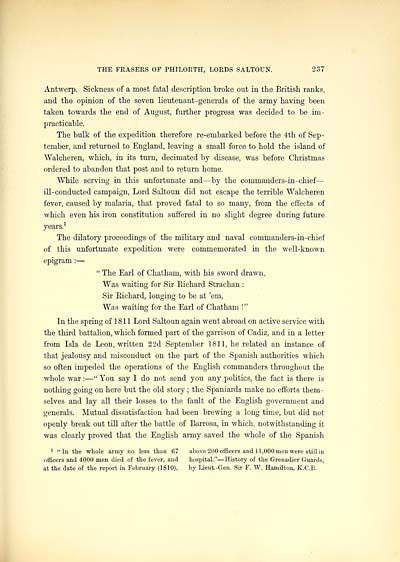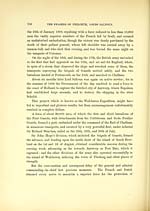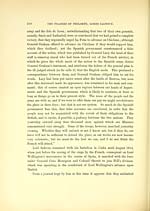Frasers of Philorth > Volume 1
(309)
Download files
Complete book:
Individual page:
Thumbnail gallery: Grid view | List view

THE FRASERS OF PHILORTH, LORDS SALTOUN. 237
Antwerp. Sickness of a most fatal description broke out in the British ranks,
and the opinion of the seven lieutenant-generals of the army having been
taken towards the end of August, further progress was decided to be im-
practicable.
The bulk of the expedition therefore re-embarked before the 4th of Sep-
tember, and returned to England, leaving a small force to hold the island of
Walcheren, which, in its turn, decimated by disease, was before Christmas
ordered to abandon that post and to return home.
While serving in this unfortunate and — by the commanders-in-chief —
ill-conducted campaign, Lord Saltoun did not escape the terrible Walcheren
fever, caused by malaria, that proved fatal to so many, from the effects of
which even his iron constitution suffered in no slight degree during future
years. 1
The dilatory proceedings of the military and naval commanders-in-chief
of this unfortunate expedition were commemorated in the well-known
epigram : —
" The Earl of Chatham, with his sword drawn,
Was waiting for Sir Eichard Strachan :
Sir Eichard, longing to be at 'em,
Was waiting for the Earl of Chatham \"
In the spring of 1811 Lord Saltoun again went abroad on active service with
the third battalion, which formed part of the garrison of Cadiz, and in a letter
from Isla de Leon, written 2 2d September 1811, he related an instance of
that jealousy and misconduct on the part of the Spanish authorities which
so often impeded the operations of the English commanders throughout the
whole war : — " You say I do not send you any politics, the fact is there is
nothing going on here but the old story ; the Spaniards make no efforts them-
selves and lay all their losses to the fault of the English government and
generals. Mutual dissatisfaction had been brewing a long time, but did not
openly break out till after the battle of Barrosa, in which, notwithstanding it
was clearly proved that the English army saved the whole of the Spanish
1 "In the whole army no less than 67 above 200 officers and 11,000 men were still in
officers and 4000 men died of the fever, and hospital." — History of the Grenadier Guards,
at the date of the report in February (1810), by Lieut. -Gen. Sir F. W. Hamilton, K.C.B.
Antwerp. Sickness of a most fatal description broke out in the British ranks,
and the opinion of the seven lieutenant-generals of the army having been
taken towards the end of August, further progress was decided to be im-
practicable.
The bulk of the expedition therefore re-embarked before the 4th of Sep-
tember, and returned to England, leaving a small force to hold the island of
Walcheren, which, in its turn, decimated by disease, was before Christmas
ordered to abandon that post and to return home.
While serving in this unfortunate and — by the commanders-in-chief —
ill-conducted campaign, Lord Saltoun did not escape the terrible Walcheren
fever, caused by malaria, that proved fatal to so many, from the effects of
which even his iron constitution suffered in no slight degree during future
years. 1
The dilatory proceedings of the military and naval commanders-in-chief
of this unfortunate expedition were commemorated in the well-known
epigram : —
" The Earl of Chatham, with his sword drawn,
Was waiting for Sir Eichard Strachan :
Sir Eichard, longing to be at 'em,
Was waiting for the Earl of Chatham \"
In the spring of 1811 Lord Saltoun again went abroad on active service with
the third battalion, which formed part of the garrison of Cadiz, and in a letter
from Isla de Leon, written 2 2d September 1811, he related an instance of
that jealousy and misconduct on the part of the Spanish authorities which
so often impeded the operations of the English commanders throughout the
whole war : — " You say I do not send you any politics, the fact is there is
nothing going on here but the old story ; the Spaniards make no efforts them-
selves and lay all their losses to the fault of the English government and
generals. Mutual dissatisfaction had been brewing a long time, but did not
openly break out till after the battle of Barrosa, in which, notwithstanding it
was clearly proved that the English army saved the whole of the Spanish
1 "In the whole army no less than 67 above 200 officers and 11,000 men were still in
officers and 4000 men died of the fever, and hospital." — History of the Grenadier Guards,
at the date of the report in February (1810), by Lieut. -Gen. Sir F. W. Hamilton, K.C.B.
Set display mode to:
![]() Universal Viewer |
Universal Viewer | ![]() Mirador |
Large image | Transcription
Mirador |
Large image | Transcription
Images and transcriptions on this page, including medium image downloads, may be used under the Creative Commons Attribution 4.0 International Licence unless otherwise stated. ![]()
| Histories of Scottish families > Frasers of Philorth > Volume 1 > (309) |
|---|
| Permanent URL | https://digital.nls.uk/96569208 |
|---|
| Attribution and copyright: |
|
|---|
| Description | A selection of almost 400 printed items relating to the history of Scottish families, mostly dating from the 19th and early 20th centuries. Includes memoirs, genealogies and clan histories, with a few produced by emigrant families. The earliest family history goes back to AD 916. |
|---|

